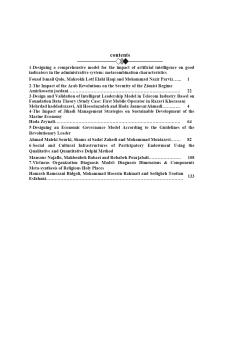The Impact of Jihadi Management Strategies on Sustainable Development of the Marine Economy
Subject Areas : Jihadi management
1 - Department of Business Management, West Tehran Branch, Islamic Azad University, Tehran, Iran
Keywords: Jihadi Management, Sustainable Development, Marine Economy, Environmental Protection,
Abstract :
Today, economic and environmental challenges have made sustainable development a top priority for countries. In this regard, Jihadi management strategies have gained significance as an innovative approach to utilizing marine resources and preserving the environment. This study examines the impact of these strategies on the sustainable development of Iran's marine economy. The research method is applied in terms of purpose, quantitative in data type, and descriptive-analytical with a correlational approach in design. Data were collected from 335 respondents using a researcher-made questionnaire, and the validity and reliability of the tool were confirmed with standard indices. Findings revealed that Jihadi management strategies, including human development, justice, environmental protection, and social participation, significantly affect the sustainable development of Iran's marine economy with 99% confidence. Social participation had the highest impact, with a coefficient of 0.743. These results indicate that Jihadi management strategies, by enhancing economic productivity and protecting marine resources, contribute to improved environmental and social conditions. The findings provide a scientific basis for policymakers and economic stakeholders to design effective programs in the marine economy sector.
1. مهدی-استادی جعفری. (2021). «توسعه دریامحور و اقتصاد دریا، ضرورتی بی بدیل در تحقق اقتصاد پویا و مقاومتی کشور».
2. بیک زاد جعفر، رزم جو مریم و رحمتی مریم. (2021). «الگوسازی تاثیر مدیریت جهادی و رفتار سیاسی بر بهرهوری نیروی انسانی با نقش واسطه ای فضیلت سازمانی».
3. حیدری بهنوییه، رنجبر، مختار، گیوکی و حیدری بهنوییه. (2023). «طراحی و اعتبارسنجی مدل توسعه پایدار جمهوری اسلامی ایران با رویکرد مدیریت جهادی. فصلنامه آمـــــوزش و بهبود منابع انسانی» 12 (سال چهارم، شماره سوم، پاییز1402), 102-117.
4. ذبیحالهنژاد ، شریفی و لیلائی. (2021). «تحقق اقتصاد مقاومتی با رویکرد مدیریت جهادی؛ راهکاری برای توسعه اقتصادی. دانش انتظامی مازندران» 45(12)، 61-96.
5. رضایی، م. و نیکوکار، ج. (1398). «عدالت اجتماعی و اقتصادی در مدیریت منابع دریایی: بررسی موردی استان مازندران». مجله علوم اجتماعی و انسانی 15(4), 100-115.
6. زارعی، ع. و رحیمی، ن. (1399). «نقش آموزش در توسعه پایدار جوامع ساحلی ایران». فصلنامه پژوهشهای اجتماعی، 10(1)، 20-35.
7. سبحانیان، دسینه، نجاتی و بلاغی اینالو. (1402). «اقتصاد دریا محور؛ تولید، اشتغال و صادرات: رویکرد تعادل عمومی قابل محاسبهی چند منطقهای». نشریه علمی پژوهشی اقیانوسشناسی، 14(56)، 31-46.
8. عالی پور، عنایتی و ترانه. (2021). «طراحی مدل آینده بازار کار در افق 1404 با رویکرد مدیریت جهادی و اقتصاد مقاومتی». فصلنامه اقتصاد دفاع و توسعه پایدار، 5(18)، 135-158.
9. کامرانی, دلیری, مسلم, غطاوی, صبا. (2024). «عدالت آبی: جایگاه صید خُرد در توسعه پایدار اقتصاد دریامحوردر آبهای ایرانی خلیجفارس». نشریه علمی پژوهشی اقیانوس شناسی 15(57), 11-19.
10. کرمی، سعید. ، حسینی، محمد. (1401). «توسعه پایدار و حفاظت از محیط زیست در مناطق ساحلی ایران. مجله محیط زیست و توسعه پایدار» 8(2), 75-90.
11. هاشمی، محمود. و غلامی، سعید. (1400). «مدیریت پایدار منابع دریایی و توسعه اقتصادی: چالشها و راهکارها. مجله اقتصاد دریایی ایران»، 12(3), 45-60.
منابع خارجی
Ochoa-Ochoa, L. M., Ríos-Muñoz, C. A., Johnson, S. B., Flores-Villela, O. A., Arroyo-Cabrales, J., & Martínez-Gordillo, M. (2019). Invasive species: Legislation and species list considerations from Mexico. Environmental Science & Policy, 96, 59-63.
Choudhary, P., Khade, M., Savant, S., Musale, A., Chelliah, M. S., & Dasgupta, S. (2021). Empowering blue economy: From underrated ecosystem to sustainable industry. Journal of environmental management, 291, 112697.
Diniz, N. V., Cunha, D. R., de Santana Porte, M., Oliveira, C. B. M., & de Freitas Fernandes, F. (2024). A bibliometric analysis of sustainable development goals in the maritime industry and port sector. Regional Studies in Marine Science, 69, 103319.
Gonzalez, G. M., Wiff, R., Marshall, C. T., & Cornulier, T. (2021). Estimating spatio-temporal distribution of fish and gear selectivity functions from pooled scientific survey and commercial fishing data. Fisheries Research, 243, 106054.
Kumar, P., Uthappa, A. R., Chavan, S. B., Chichaghare, A. R., Debta, H., Bhat, S., & Dagar, J. C. (2023). Achieving biodiversity conservation, livelihood security and sustainable development goals through agroforestry in coastal and island regions of India and Southeast Asia. In Agroforestry for sustainable intensification of agriculture in Asia and Africa (pp. 429-486). Singapore: Springer Nature Singapore.
Lee, K. H., Noh, J., & Khim, J. S. (2020). The Blue Economy and the United Nations’ sustainable development goals: Challenges and opportunities. Environment international, 137, 105528.
Ren, W., & Ji, J. (2021). How do environmental regulation and technological innovation affect the sustainable development of marine economy: New evidence from China’s coastal provinces and cities. Marine Policy, 128, 104468.
Smith, J., & Brown, T. (2020). The role of community engagement in sustainable marine resource management. Ocean & Coastal Management, 182, 104932. https://doi.org/10.1016/j.ocecoaman.2019.104932
Wang, X., Yuen, K. F., Wong, Y. D., & Li, K. X. (2020). How can the maritime industry meet Sustainable Development Goals? An analysis of sustainability reports from the social entrepreneurship perspective. Transportation Research Part D: Transport and Environment, 78, 102173.
Thompson, G., & Ritchie, H. (2021). Integrating social equity into marine resource management: Challenges and opportunities. Marine Policy, 127, 104316. https://doi.org/10.1016/j.marpol.2021.104316
Wang, X., Yuen, K. F., Wong, Y. D., & Li, K. X. (2020). How can the maritime industry meet Sustainable Development Goals? An analysis of sustainability reports from the social entrepreneurship perspective. Transportation Research Part D: Transport and Environment, 78, 102173.

